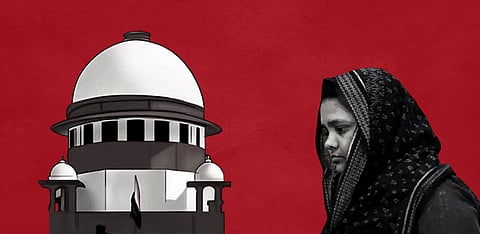

The Supreme Court agreed to the petitioners' request for time to respond to the "bulky" counter-affidavit filed by the Gujarat government, and refused to entertain any new writ petitions in the matter.
—-
THE Supreme Court earlier today granted time to the petitioners challenging the remission granted to the convicts in the Bilkis Bano atrocity till November 29 to respond to the counter-affidavit filed by the Gujarat government.
A division bench of the court, comprising Justices Ajay Rastogi and C.T. Ravikumar, described the 57-page counter-affidavit as "very bulky", and questioned it for only carrying a series of judgments, without laying out the factual scenario or showing any application of mind.
It agreed to the request of senior advocate Kapil Sibal, representing the petitioners, seeking time to respond to the pleadings filed by the State and the convicts. The bench asked the counsel for the State and the convicts to make available copies of the counter-affidavit to all the lawyers representing the petitioners.
The petitions, filed by a diverse group of civil society members that include politicians, academics, retired bureaucrats, journalists and activists, have questioned the remission granted to eleven persons who were convicted for the gangrape of Bano, who was 21 years old and pregnant at that time, and the murder of several of her family members, including her infant daughter, in Gujarat in 2002.
The eleven persons had been convicted by a Sessions court in Mumbai in 2008 for the offences of murder, gangrape, rape on a pregnant woman, and been awarded rigorous imprisonment for life, along with a fine. The findings of the sessions court were subsequently, on appeal, upheld by the Bombay High Court and the Supreme Court.
The convicts were granted remission for good behaviour by the Gujarat government, and set free in August after 15 years of imprisonment. Their request for premature release was considered pursuant to a direction by a division bench of the Supreme Court, comprising Justice Rastogi, in May, directing the Gujarat government to decide the applications of the convicts for premature release under the government's 1992 remission policy, within two months.
The counter-affidavit filed by the Gujarat government yesterday revealed that the remission had been granted to the convicts on the basis of approval of the Union Home Ministry, even as it had been opposed by the Superintendent of Police, Special Crime Branch, Central Bureau of Investigation ('CBI'), Mumbai, as well as a special judge of the CBI, on the basis of the heinous nature of their crimes.
Solicitor General of India, Tushar Mehta, for the Gujarat government, and advocate Rishi Malhotra, for the convicts, questioned the locus standi of the petitioners, terming them "interlopers". This did not sway the bench, although it did bar the consideration of any new petitions in the matter.